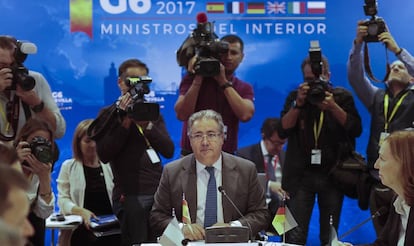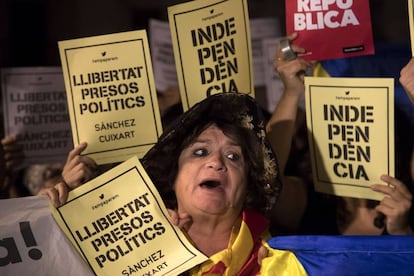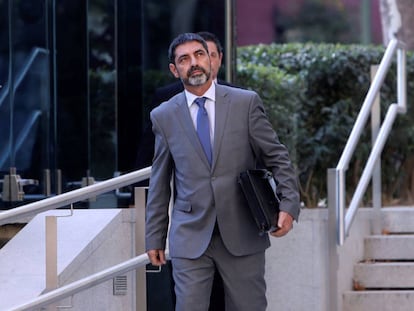Chiefs of Catalan security forces will be replaced if Article 155 is activated
Spanish Interior Ministry could find substitutes for internal affairs, police force and Civil Protection


If there is any kind of agreement over Article 155 of the Spanish Constitution, it is that “nobody knows exactly how to apply it.”
That is because this obscure provision, which has never been used since the Constitution came into force in 1978, does not specify the measures that fall within its scope.
All sources consulted for this story agreed that the Spanish government is not overly enthusiastic about invoking Article 155 to curb the Catalan secession drive “because nobody really knows how to carry it out: it has not been developed, and there are no supporting regulations.”
The role of the Mossos will be tested in the event of street mobilizations
But if the central government finally resorts to this tool to force Catalan authorities to obey the law, there are three key agencies whose chiefs will likely get replaced first: the Catalan department of internal affairs, the Mossos d’Esquadra police force and Civil Protection, the agency to protect civilians in the event of natural or man-made disasters.
Article 155 states that “if a self-governing region does not fulfill the obligations imposed upon it by the Constitution or other laws, or acts in a way that is seriously prejudicial to the general interest of Spain, the government, after having lodged a complaint with the premier of the self-governing region and failing to receive satisfaction therefore, may, following approval granted by the overall majority of the Senate, take all measures necessary to compel the region to meet said obligations, or to protect the above-mentioned general interest.”

What these “necessary measures” would be is left open to interpretation, but a technical team made up of politicians, security experts and jurists is currently working on fleshing out the provision, according to sources at the Office of the State Secretary for Security.
The first measures will in all likelihood focus on taking control of Catalan agencies that deal with security issues.
“Initially, a low-key level of implementation is expected,” said a high-ranking official from the Civil Guard. This would rule out a full-blown suspension of Catalan home rule, at least in the early stages.
Initially, a low-key level of implementation is expected
Civil Guard official
The Spanish Interior Ministry has a list of potential measures in the event that Catalan premier Carles Puigdemont confirms that he has indeed declared unilateral independence in the region – a fact that remains unclear following his ambiguous statement of last Tuesday.
Prime Minister Mariano Rajoy gave Puigdemont a deadline ending this week to confirm whether he has or hasn’t declared independence – and to drop his breakaway plans if he has. But on Monday, the Catalan leader sent back a letter ignoring the question, and instead offering to sit down to talks based on an alleged popular mandate to declare independence from Spain.
Madrid has said that talks to reform the Constitution are possible, but first the Catalan government must abandon its secession project and “return to the law.” The deadlock makes it increasingly likely that Article 155 will soon be activated.
“The logical thing would be for the Catalan interior chief Joaquim Forn to lose his powers and have these taken over by the Interior Ministry’s secretary of state for security,” said these sources. Other sources said this role could be played by the central government’s delegate in Catalonia, Enric Millo.

But the relationship between Millo and Interior Minister Juan Ignacio Zoido has been strained ever since the former publicly apologized for the police violence on October 1, when a banned referendum was held in the region. Zoido traveled to Catalonia and defended the actions of Spain’s law enforcement agencies.
Also in line for a possible replacement are Mossos d’Esquadra director Pere Soler and chief officer Josep Lluís Trapero, who is being investigated for sedition by Spain’s High Court, the Audiencia Nacional. Whoever takes over will be in charge of more than 14,000 officers who seem to be ideologically divided over their own role, following accusations of a pro-independence bias.
Civil Protection chief Joan Delort could also get a substitute soon.
The Mossos will remain in charge of preserving the peace, and this role will be tested in the event of street mobilizations of the kind being planned by grassroots activists with ties to ANC and Òmnium – whose heads have just been sent to jail without bail as part of a sedition probe – as well as by anti-capitalist groups. Leaders of CUP, the anti-capitalist party whose 10 seats in the Catalan parliament have been supporting the minority government of Carles Puigdemont, are pressuring the latter to openly declare a Catalan republic.
“The basic role of the Mossos is to ensure that those people do not take the streets. They must guarantee public order,” said Interior Ministry sources. “If they fail to act against disturbances of the peace on state property, then the National Police or Civil Guard will automatically step in.”
There are still nearly 6,000 officers from these two law enforcement agencies stationed in Catalonia, where they are staying at hotels and on moored ferries as they await further instructions.
English version by Susana Urra.
Tu suscripción se está usando en otro dispositivo
¿Quieres añadir otro usuario a tu suscripción?
Si continúas leyendo en este dispositivo, no se podrá leer en el otro.
FlechaTu suscripción se está usando en otro dispositivo y solo puedes acceder a EL PAÍS desde un dispositivo a la vez.
Si quieres compartir tu cuenta, cambia tu suscripción a la modalidad Premium, así podrás añadir otro usuario. Cada uno accederá con su propia cuenta de email, lo que os permitirá personalizar vuestra experiencia en EL PAÍS.
¿Tienes una suscripción de empresa? Accede aquí para contratar más cuentas.
En el caso de no saber quién está usando tu cuenta, te recomendamos cambiar tu contraseña aquí.
Si decides continuar compartiendo tu cuenta, este mensaje se mostrará en tu dispositivo y en el de la otra persona que está usando tu cuenta de forma indefinida, afectando a tu experiencia de lectura. Puedes consultar aquí los términos y condiciones de la suscripción digital.








































